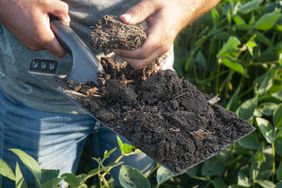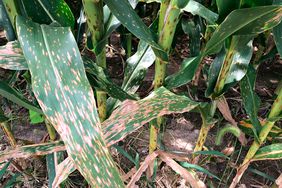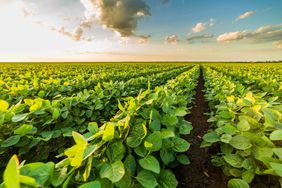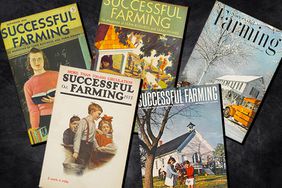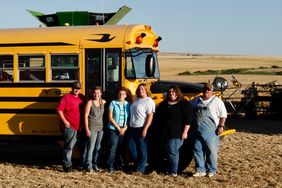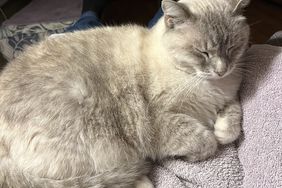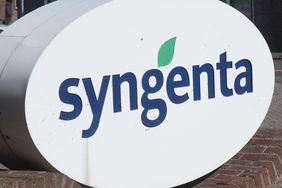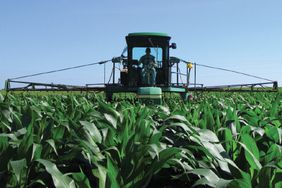:max_bytes(150000):strip_icc()/40SeasonsDec23_LagerFamily-94f4d1eb7a664235a54a2903e1e44d5e.jpg)
Courtesy Tannah Lager, Tannah Terry Photography
Success can be measured in many ways, but having three children follow in your footsteps is one indication you’ve done something right.
Robert Lager took over the family farm south of Maryville, Missouri, when he was just 20 years old, and now has 40 seasons under his belt. He and wife Terri raised sons Shelby and Fritz and daughter Anna on the farm Robert’s parents bought in 1957. Today, Robert farms 3,000 acres of corn and soybeans, has 120 cow-calf pairs, and does custom farming.
Shelby works with Robert and has his own cattle and cropland. He and wife Tannah just welcomed their first child, a son named Hesston, a few months ago. Shelby earned a degree in ag science from Northwest Missouri State University in Maryville, which is also his dad’s alma mater.
The younger Lager children also decided to stay close to home and go to Northwest Missouri State. Fritz is a junior studying ag science, and Anna is a freshman majoring in ag business.
Generations of Conservation
Caring for the soil is one of Robert’s primary missions. “It was instilled in me from my father,” he says. “He bought this farm and started terracing it. I finished terracing it, then I bought a couple of farms around here, and soil conservation has been one of my top priorities.”
In the 1980s, a neighbor started using no-till practices. “I couldn’t even imagine what he was doing there by not working the ground,” Robert says. “I tried it the next year on a little bit of ground and now I’m 99% no-till.”
He has also added cover crops over the past several years, mostly rye and wheat, with a few turnips and radishes. “We really like what that’s done for the soil,” he says.
In March, Robert was named Conservationist of the Year by the Nodaway County Soil and Water Conservation District. He has been a member of the district for 14 years and chairman for the past seven.
Shelby has learned to care for the land from his father, even if it’s rented ground. “When I talk to the landlord, I tell him that my dad taught me you don’t just protect your ground for right now, you protect it for the next generation,” he says. “I tell them I will treat their ground like it’s my own.”
Those relationships are important because finding ground to rent is difficult. “I want to grow our cattle herd and find pastures, but being a young guy starting out, you can’t go out and pay top dollar for it,” Shelby says. “I’ve been lucky to find landlords that want to help the young generation get started, so they’ve been willing to work with me and I’m working with them.”
Not All Years Are Good Years
Robert says 1993 was his most challenging year. “I had just bought a farm on the river bottom, and we had the flood in ’93 and that wiped it out,” he says. “Yeah, we got 300 bushels of corn and 200 bushels of beans, but unfortunately that was off of 200 acres.”
The farm crisis and low prices of the late ’80s and early ’90s were also rough. “I was just getting started farming,” Robert says. “The experience helped me, though. I learned that just because you have a good year, that doesn’t mean they’re all going to be like that.”
During those times, Robert remembered some words of wisdom from his father.
“My dad told me, ‘It’s not the bad years that break you, it’s the good years,’” he says. “I thought, What are you talking about? Then after experiencing it, it’s very true. Good years can spoil you.”
Robert says the key to surviving those hard years is to “tighten up your belt, have faith in God, and work your butt off.”
Shelby is taking those lessons to heart. “I go to Dad a lot for advice,” he says. “I haven’t been through those tough times and I don’t know what that’s like so I know I can learn a lot from him.”
:max_bytes(150000):strip_icc()/40SeasonsDec23_LagerHerefords-364cdc3463384dbcae10095c4dcdab5d.jpg)
Courtesy Tannah Lager, Tannah Terry Photography
Building Community
While having family nearby to help during busy times is a bonus, Robert says building a team of experts he trusts has allowed him to focus on what he loves to do, which is farm.
Marketing is one area where expert advice is sought. “That’s something that I really stress with Shelby,” Robert says. “I wish I would’ve learned more about it in college, but at the time I didn’t realize it was that important. I’ve learned a lot over the years.
“Our seedsman is my nephew, and I get a lot of agronomy advice from him,” he says. “If I’m having problems, they have people in the company who come out and help us a lot. There are also agronomists where we buy our fertilizer. It’s a pretty tight community around here.”
The Lagers have instilled that sense of community in their children by example.
“I think that’s an important part of keeping small communities going,” he says. Robert has been a member of the Nodaway County Cattlemen’s Association since its inception and served as president for multiple terms. He spent 25 years on the Senate Bill 40 Board, working to support those with developmental disabilities. Terri volunteers with Big Brothers Big Sisters of Nodaway County and was involved in 4-H when their kids were in school.
A few years ago, Shelby joined his dad on the cattlemen’s board, which is very active in the community. “This spring when I sold my first crop of bulls, I think that helped me, because I’ve talked to so many people between our banquet and our different events,” he says. “It has helped me make some good connections.”
The Next 40 Seasons
There has been a lot of focus on the future in the Lager family, especially with the arrival of baby Hesston.
“I’m hoping Shelby will take over the cattle in a couple of years and then I can be out of that,” Robert says.
Shelby and Tannah bought a herd of Herefords from a producer in northern Iowa last year. “They’re hard to find around here,” he says. “He let me pick them out, and I started a herd. We’re going to start growing it and hopefully when I take over Dad’s cows, I can keep back heifers and start replacing his commercial cows with Herefords.”
Meanwhile, Shelby will continue to work with his dad and expand his own operation when feasible. That can be a difficult thing to balance. “You have to be conservative, but you also can’t let the finances scare you too much,” he says. “You’ve got to stick your neck out a little bit and try it but keep it within reason. You have to protect tomorrow.”
Robert’s advice to his son is this: “Have faith in God and he’ll get you through it.”
Robert and Terri would love to have their kids all stay close to home but want them to follow their own paths. “I hope they all three end up right around here and farm together, but that’s their choice,” Robert says. “I’ll give them the opportunity and if they want to come back, they can.”
:max_bytes(150000):strip_icc()/LisaFoustPrater-5d5284849acc417c8678324f9c660161.jpg)

